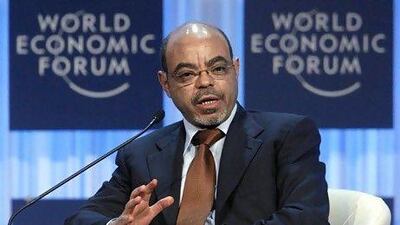ADDIS ABABA // Meles Zenawi, the Ethiopian prime minister who took a leading role in efforts to curb Islamist militants in the Horn of Africa, has died in a Belgian hospital after a long battle with illness.
Speculation that Meles, 57, was seriously ill had grown after he failed to attend an African Union summit in Addis Ababa last month.
Hailemariam Desalegn, the deputy prime minister, was named acting prime minister and will be sworn in by parliament.
"The prime minister passed away around midnight [on Monday night]. It's time for his remains to come back," said the government's spokesman and Meles's right-hand-man, Bereket Simon.
Mr Bereket said Meles had been ill for a year and was recuperating before being suddenly rushed to intensive care.
Meles seized power in 1991 from Mengistu Haile Mariam's military junta and went on to become a towering political figure on the continent, widely credited for steering one of the world's poorest countries to high economic growth.
He helped to fight insurgencies in Somalia, where he sent troops for the second time in December to help to drive out Islamist Al Shabbab militants.
Ethiopian forces also patrol Abyei, which is claimed by both Sudan and South Sudan. His death may slow international efforts to end conflict in the region, according to analysts such as Patrick Mair at Control Risks in London.
"Hailemariam's priority in the immediate term will be keeping a hold on domestic stability," Mr Mair said. He added that Ethiopia is "scaling back its military commitment in Somalia", which will allow Mr Hailemariam to focus on issues at home.
Cafes in Addis Ababa's affluent Bole Tele district were packed with people glued to television sets after a special news broadcast announced Meles's death.
The secretive government did not reveal where he was being treated or the nature of his illness, but a European Union source said he died in Brussels, where he had been a patient at the Saint-Luc University Hospital. A cortege accompanied by police riders left a hotel next to the hospital and took a casket, believed to hold Meles's body, to a private airstrip near the city's main airport.
Belgian military officials and police were at the airport as the casket was loaded on to an Ethiopian Airlines jet.
Enemy of Al Shabbab
Somalia's Al Shabbab militants, who faced Ethiopian troops twice under Meles's tenure - once in 2006-2009 and again from December - hailed the former leader's death.
"He led the African leaders who had fingers in Somalia for two decades, but all in vain," said a spokesman, Sheikh Ali Mohamud Rage.
Mr Bereket, who declared a period of national mourning until Meles's body arrives in Ethiopia, said Africa's second-most-populous nation was stable and would continue on the path charted by the late premier.
The ruling party, Ethiopian People's Revolutionary Democratic Front (EPRDF), will meet to select a permanent successor, although a date has not yet been set.
Negasso Gidada, a former president during Meles's tenure and now chairman of the opposition Unity for Democracy and Justice, said he hoped the succession of power would be peaceful.
"We urge the EPRDF to change for the good the political, democratic and human-rights situation in the country," he said.
David Shinn, a former US ambassador to Ethiopia, said he expected many of Meles's defence policies to remain the same. "For internal security reasons, there will be a continuing focus on Somalia and I do not foresee any significant change towards Eritrea," he said.
Ethiopia and Eritrea fought a decade-long border war. Meles oversaw a seven-year run of double digit economic growth, advocating a mix of heavy state spending and private investment.
He was widely applauded for ploughing money into infrastructure, but criticised by some for selling off swathes of land to foreigners. Many Ethiopians complain that his close business ties with China did not translate into more jobs.
Rights record
International rights groups say Meles was intolerant of dissent. He rounded up numerous opposition leaders after the disputed 2005 polls, while several opponents and journalists have been arrested under a 2009 antiterrorism law.
"Today is a day of joy for most Ethiopians and all freedom loving people around the world," said the opposition website, Ethiopian Review, describing Meles as a "genocidal tyrant".
An outlawed Ethiopian rebel group called his death a chance for a new era of peace, but reaffirmed its readiness to fight for self-determination. "The death of the Ethiopian dictator may usher a new era of stability and peace in Ethiopia and in the Horn as a whole," read a statement by the Ogaden National Liberation Front.
The European Commission said Meles had worked hard on African unity, climate change and development, but hoped the country would improve its human rights record.
"I sincerely hope Ethiopia will enhance its path of democratisation, upholding of human rights and prosperity for its people, and of further regional stabilisation and integration," said José Manuel Barroso, the European Commission president.
Mr Hailemariam, the acting prime minister, 47, was an adviser to Meles in 2006 before being picked as his deputy in 2010.
He had also replaced Meles as chair of a number of parliamentary committees in the past few years, a sign that he was being groomed for the post, diplomats say.
* With additional reporting by Bloomberg and Agence France-Presse

